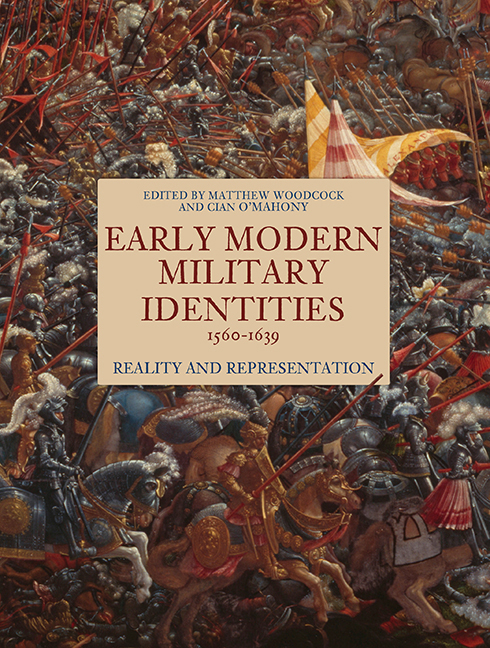Book contents
- Frontmatter
- Contents
- List of Illustrations
- List of Contributors
- Acknowledgments
- List of Abbreviations
- Introduction
- Part I Models of Military Identity
- Part II Military Identities in Early odern Ireland
- 5 The Clergy and the Military in Early Modern Ireland
- 6 ‘Trust, Desert, Power and skill to serve’: The Old English and Military Identities in Late Elizabethan Ireland
- 7 Artifice in Ormonius: Why a Renaissance Latin Epic Falsified the Military History of a Tudor Irish General
- 8 Irish Savage and English Butcher: Military Identities and Tyrone's Rebellion, 1593-1603
- 9 A print in my body of this day's service’: Finding Meaning in Wounding During and After the Nine Years War
- Part III Staging Military Identities
- Afterword: The Way Ahead
- Bibliography
- Index
7 - Artifice in Ormonius: Why a Renaissance Latin Epic Falsified the Military History of a Tudor Irish General
from Part II - Military Identities in Early odern Ireland
Published online by Cambridge University Press: 14 September 2019
- Frontmatter
- Contents
- List of Illustrations
- List of Contributors
- Acknowledgments
- List of Abbreviations
- Introduction
- Part I Models of Military Identity
- Part II Military Identities in Early odern Ireland
- 5 The Clergy and the Military in Early Modern Ireland
- 6 ‘Trust, Desert, Power and skill to serve’: The Old English and Military Identities in Late Elizabethan Ireland
- 7 Artifice in Ormonius: Why a Renaissance Latin Epic Falsified the Military History of a Tudor Irish General
- 8 Irish Savage and English Butcher: Military Identities and Tyrone's Rebellion, 1593-1603
- 9 A print in my body of this day's service’: Finding Meaning in Wounding During and After the Nine Years War
- Part III Staging Military Identities
- Afterword: The Way Ahead
- Bibliography
- Index
Summary
Seated in the white plaster-worked gallery of Carrick Castle in Tipperary, his favourite house, surrounded by some of the paintings he had collected over a lifetime but could no longer see, the blind old earl of Ormond listened attentively to his Gaelic poet, Dermot O'Meara. A physician by training, O'Meara was reciting in perfect Latin the lines of a major new composition. It was summer 1614. The room was hushed as O'Meara spoke. Partly this was because Ormond, grown increasingly cantankerous in his old age, disliked noise and disruption, and ordinarily demanded quiet from his household servants. But it was also because the poem was important for the earl. He was its central subject. What it said about him, and how it said it, would affect his honour and reputation. It was his strong hope that O'Meara's Latin verses would help to secure his and his family's fame and renown in perpetuity. Called Ormonius, the poem would place the Butlers’ military identity within an ancient classical tradition of martial celebration. It contained a history of the recently completed Tudor conquest of Ireland, but one that was written from the earl's ‘Old English’ (or Anglo-Irish) point of view. Line after flowing line it recounted scenes from the battlefield, recalling the younger, vigorous Ormond who for almost fifty years prior to 1603 had repeatedly summoned his Butler troops to serve under the royal banners. As much a political testament as a literary entertainment, it asserted the rights of the Old English Butler family to continued crown favour by placing the earl and his followers at the heart of the conquest storyline.
Like other poems of its type, Ormonius was immodest in its praise – hagiographical, sycophantic. It implied Ireland had been subdued for the crown not only by English-born officers and soldiers, but by a hero-earl of unequalled military prowess and his brave and steadfast kindred, who, like him, were Irish-born subjects of English descent. Successively military commissioner of Munster and Thomond (1570–1), Lord General of Munster (1579–81, 1582–4), General of the queen's army in Leinster (1594, 1596–7), and Lord Lieutenant- General of all the royal forces in the country (1597–1601), Earl Thomas had embodied all that was most distinguished about his kind.
- Type
- Chapter
- Information
- Early Modern Military Identities, 1560–1639Reality and Representation, pp. 158 - 176Publisher: Boydell & BrewerPrint publication year: 2019



